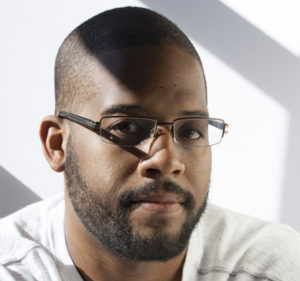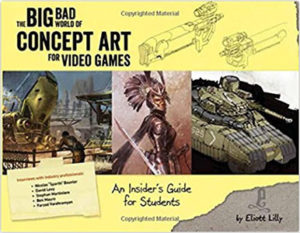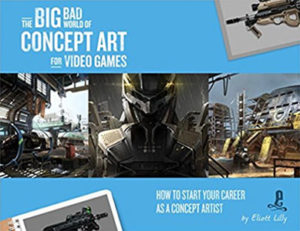How to Start and Succeed as a Concept Artist

Eliott Lilly is a concept artist working as a freelancer in the video game industry, with credits on heavy-hitting franchises including DOOM, F.E.A.R, and Black Ops. It takes hard work and persistence to achieve success as a concept artist, but it also takes dedicated mentorship (Eliott was personally trained by Donato Giancola) — and that’s why he’s paying it forward by mentoring thousands of aspiring concept artists through his books and his website, BigBadWorldOfConceptArt.com.
We spoke with Eliott to learn how new concept artists can start their careers and stand out from the crowd, and build their own success in the big bad world of concept art.
How did you start your career as a concept artist?
There’s nothing too special about my origin story. I was in my third year of college, studying illustration in New York City and planning to be a set designer for Broadway Theater, when I came across The Art of The Phantom Menace. That book changed my life — it introduced me to concept art and opened my eyes to a career path I hadn’t considered. The downside was it also meant I had to make a sudden course correction in my studies, and bust my butt for a few years to develop an entirely new portfolio.
With my shiny new portfolio in hand, I applied to four studios: Lucas Arts (obviously), Blizzard, EA, and a little known company called Day 1 Studios. Looking back, I’m really not surprised that the three big studios didn’t even write me a formal letter of rejection — they were looking for senior talent and I was fresh out of school, what was I thinking? Luckily, after taking an art test, Day 1 Studios hired me. The rest is history.
That was in 2003. Has has the industry changed since then?
I think it’s going to be harder and harder to find work as a “generalist” artist, because the trend from big, triple-A companies is to outsource. They send the bulk of the work to be done overseas, and hire freelancers who specialize in a specific subject to do the rest.
Which is cool for me, because I’m a freelancer, but sucks for artists who prefer working as full-time employees. It’s not really new, but it is quickly becoming standard practice.
If you could time travel, what career advice would you give your younger self?
I would tell myself to create a career goal and move toward it with gusto. I never stopped to think about what I really wanted from my career, I just sort of jumped in and went wherever the work took me. As a result, I feel like I wasted a lot of my “golden years” on commercial projects I wasn’t passionate about. I kind of assumed I’d always have time to figure it out. Now, I’m 35 with a kid, and it’s getting harder to course correct.
That said, assuming there were no time paradoxes involved, I would give myself a firm pat on the back for my consistent ability to come home and work on my personal projects each night. Not only did that keep me sane when I was bored out of my gourd on the job, but it provided a valuable lifeline when I needed new work to put into my portfolio but couldn’t show what I was doing on the job. My personal work got me hired at my dream job, so… yeah. Go me!
How can a new artist stand out in this competitive field?
It’s tough. There’s no secret recipe for getting attention and standing out, but if there were, I imagine it would consist of one part skill, one part authenticity, and two parts timing.
If ArtStation has taught me anything, it’s that I suck! And yet, I’ve always been employed. That tells me skill isn’t everything. I think having the skill is the bare minimum to be taken seriously in this competitive industry, but that’s not what sets you apart from others.
If ArtStation has taught me anything, it’s that I suck! And yet, I’ve always been employed. That tells me skill isn’t everything.
Authenticity makes you somewhat of an expert. People can tell when you’re the originator, or just truly passionate about a particular subject. If you can execute with decent skill, people will take notice. They’ll want to hire that person, to bring that expertise with them on the project.
Timing is everything. If you’re at the right place, at the right time, with the right body of work, you get the job. If you’re the first person to set a trend, you get people with job opportunities reaching out to you. If you heard through the grapevine that a title is ramping up in production and you immediately send your work to that studio, you may be one of the first artists to be considered for the position. Timing is everything.
What’s your best tip for a strong concept art portfolio?
Have you heard of the “ten-second elevator pitch?” It’s designed to get across what it is you do, in a hyper-short amount of time (ten seconds). Your portfolio should be built around the equivalent of a ten-second elevator pitch. Respect other people’s time — tell your story quickly and efficiently.
Why did you start writing books about careers in concept art?
Quite simply, I wanted to help. I received a lot of questions from people desperate to know anything and everything about concept art — how to build a portfolio, break in, get hired, and so on. Those were the same questions I had when I was first starting out, but there was no resource for me to turn to at the time.
One day I was telling a friend about the quantity of emails I received and how I could almost cut and paste my replies. He turned to me and said, “Well, if you already have the answers, why don’t you just organize them in a book?” It stuck with me, and two years later, I had compiled all of my thoughts into my first book: An Insider’s Guide For Students.
I hear you’re working on a new book?
Well, my first book focused on education, training and portfolio building for high school and college students. I wrote my new book, How to Start Your Career as a Concept Artist, to prepare recent graduates and upcoming professionals for a future in the video game industry. It focuses on achieving long-term goals by making smarter choices along one’s career.
It took me eight years before I reached the “aha moment” in my career, and realized what my goals were and how to achieve them. Landing my dream gig was easier than I thought, once I had that figured out. I hope my second book gets people thinking about their goals sooner, so they can find happiness faster.
It sounds corny, I’m sure, but at the heart of it, the secret to a healthy, long term career, is being happy with the work that you do. You can bet the new book is cram-packed with the best tips, strategies and practices that I’ve picked up over twelve years working as a concept artist.
It sounds corny, I’m sure, but at the heart of it, the secret to a healthy, long term career, is being happy with the work that you do.
Where can we get your books?
If you live in the USA, you can find my books on my Gumroad page. I like to autograph each copy and write a personal message to the reader, and I might even doodle something for them. If you live outside the USA, buying on Amazon.com will be your best bet.
 Big Bad World of Concept Art for Video Games: An Insider’s Guide for Students
Big Bad World of Concept Art for Video Games: An Insider’s Guide for Studentsby Eliott Lilly
A comprehensive book that gives aspiring artists an honest, informative, and concise look at what it takes to become a concept artist in the video game industry.
 The Big Bad World of Concept Art for Video Games: How to Start Your Career as a Concept Artist
The Big Bad World of Concept Art for Video Games: How to Start Your Career as a Concept Artistby Eliott Lilly
Book two in the Big Bad series, this edition goes beyond the amateur level to prepare the upcoming professional, or any other artist, for a future in the entertainment industry.
For hundreds of amazing tutorials, courses, workshops, and other resources for aspiring game artists, be sure to check out Eliott’s website BigBadWorldofConceptArt.com
Read my new book!
Making games for a living is an incredibly rewarding career, but it’s hard to break in unless you have insider knowledge. This book levels the playing field.


I’ve been struggling with this for nearly a decade. I’ve been in dead-end jobs that I hate and don’t utilize my creativity. I’ve had limited time and money (both parents passed, was an art school dropout so I could take care of my younger siblings) I too, am on artstation, instragram and I’ve contacted my favorite artists. I’ve been turned down by companies and live in a dead-end area. Networking is the most important thing I think someone can do to get a start.
Sadly, in most cases, it’s who you know and not what.